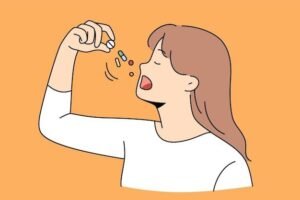Antibiotics save lives. It is one of the greatest inventions of the last century.
Due to this, the treatment of bacterial infections is easily available. There are more than 100 types of antibiotics and each has the ability to fight against certain types of infections. So it is called ‘Magic Bullet’.Gradually the acceptance of antibiotics increased.

The use of antibiotics in India is said to be indiscriminate. Antibiotics are taken for everything from a slight cold-cough to body aches, In fact there is a lack of awareness about the use of antibiotics.
It is actually the most common antimicrobial ingredient. Antibiotics are used to fight and destroy bacteria. With the advancement of technology, everyone is using this type of medicine freely. Antibiotics actually have side effects. So it should be used as per expert doctor’s advice. Taking excessive amounts of antibiotics can lead to various health problems. Our digestive system contains 800 to 1000 species of bacteria and more than seven thousand sub-species. 95% of these are beneficial, some others are really harmful .
But the blame cannot be put entirely on the doctors. It is true that many doctors over-prescribe antibiotics. But more and more people seek immediate relief from common colds by simply showing an old prescription or borrowing antibiotics from someone else or buying them over the counter without seeing a doctor. Not surprisingly, India is the largest producer and consumer of antibiotics. Are you not taking poison in the name of medicine? The World Health Organization (WHO) reports that 1.27 million people die worldwide each year due to antibiotic resistance resulting from overuse and misuse of antibiotics.
according to a study by Swedish scientists,Antibiotic resistance has been identified as one of the ten health risks facing mankind.Because of this, the patient’s hospital stay may increase from 6.4 days to 12.7 days.
 • Why should you take antibiotics as prescribed by your doctor?
• Why should you take antibiotics as prescribed by your doctor?
Certain antibiotics are effective against certain infections or bacteria; However, they do not work against all bacterial or viral or fungal infections. All medicines, including antibiotics, have side effects. This is why their requirement to be modified based on one’s body systems, such as kidney function and liver function.
• When should you take antibiotics ?
Experts say fever is a common symptom in all respiratory diseases. However, any fever does not necessarily mean that it is caused by a bacterial infection. Sudden onset of severe sore throat, headache, swollen tonsils, cough with phlegm indicates bacterial fever. Antibiotics should be used in that case. Antibiotics can be taken as per doctor’s advice in case of sore throat, brain disease.

• Overuse of antibiotics
If you use to take too many antibiotics, your body may develop a resistance to the antibiotic medicine. Then it can make the antibiotics less effective.
Excessive use of antibiotic treatment in the absence of a serious bacterial disease weakens the body’s immune system.
Some antibiotics can cause side effects, ranging from digestive problems to bone damage. The most common side effects associated with antibiotics are rash, Respiratory difficulties,Nausea and vomiting,Diarrhea,Stomach pain,Swelling of joints,Retinal detachment,Heart palpitations, Muscle spasms and many more.
• Antibiotics on children’ health
Some classes of antibiotics, were associated with an increased risk of miscarriage before the 18th week of pregnancy. Children are at higher risk for side effects of antibiotics. researchers analyzed that about 80% children affected to an allergic reaction, such as a rash, itching or diarrhea after using too much antibiotics.

• Antibiotics on senior’s health
Researchers have analyzed whether long-term antibiotic use can have negative effects in a senior person. Some researchers also followed women and men( more than 60 year old) who reported about their less antibiotic use. They told that they were free of heart disease. Even their bone pain was not diagnosed that severe way.

• How to understand that antibiotics do not suit your body?
Anyone experiencing symptoms such as diarrhea, nausea,shortness of breath, or dizziness after taking antibiotics should seek immediate medical attention.
• What should be followed in the use of antibiotic.
experts suggest about what precautions to take when using antibiotics : some precautions are given below.
•Do not take antibiotics unless prescribed by a doctor. Do not take antibiotics on the advice of the shopkeeper.
•Antibiotics should be taken for the full duration once started. Cannot be stopped midway.
•For common seasonal ailments such as colds, fevers or sore throats, take symptomatic measures rather than antibiotics.

• Do not delay taking the antibiotic for too long after opening the packet.
• Antibiotics used to treat one person should not be taken by another.










